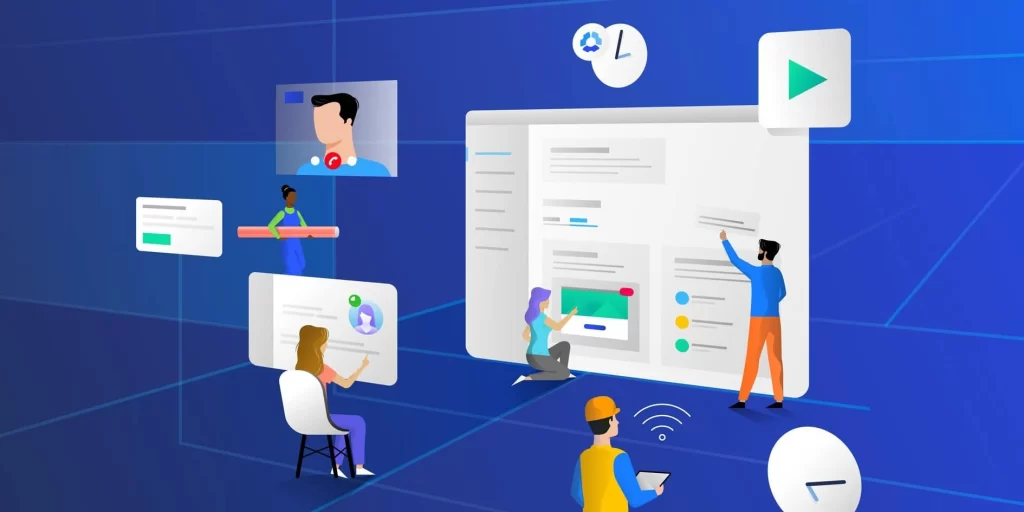In today’s evolving work environment, leading a remote team effectively has become a critical skill for managers. The shift to remote work has introduced unique challenges and opportunities, necessitating a refined approach to leadership. In this comprehensive guide, we explore advanced strategies for leading remote teams with precision and impact, ensuring productivity, engagement, and success.

Establish Clear Communication Channels
One of the foremost challenges in remote leadership is maintaining clear and consistent communication. Remote teams often struggle with misunderstandings due to the absence of face-to-face interactions. To combat this, it is essential to:
- Utilize Multiple Communication Tools: Leverage a combination of tools such as Slack for instant messaging, Zoom for video meetings, and Asana for task management. Each tool serves a specific purpose and helps ensure that communication remains organized and efficient.
- Set Clear Communication Guidelines: Define expectations for response times, preferred communication channels, and meeting protocols. This clarity helps team members understand how and when to communicate effectively.
- Encourage Regular Check-Ins: Schedule regular one-on-one and team meetings to address issues, provide feedback, and keep everyone aligned on goals and deadlines.
Foster a Collaborative Culture
Building a strong collaborative culture in a remote setting is crucial for team cohesion and productivity. Here’s how to cultivate a collaborative environment:
- Promote Knowledge Sharing: Create platforms where team members can share insights, resources, and best practices. Tools like Confluence or internal wikis can serve as valuable repositories for team knowledge.
- Facilitate Team-Building Activities: Organize virtual team-building exercises that encourage interaction and camaraderie. Activities such as online games, virtual coffee breaks, or collaborative projects can help strengthen relationships among team members.
- Encourage Cross-Functional Collaboration: Promote interactions between different departments or roles to enhance understanding and cooperation. Cross-functional projects can lead to innovative solutions and a more unified team.
Implement Effective Project Management
Effective project management is fundamental to remote team success. Properly managing projects ensures that goals are met and resources are utilized efficiently. Key strategies include:
- Adopt Project Management Tools: Tools like Trello, Jira, or Monday.com help in tracking progress, assigning tasks, and managing deadlines. These tools provide visibility into project status and facilitate coordination among team members.
- Define Roles and Responsibilities Clearly: Ensure that each team member understands their specific role and responsibilities within the project. Clear role definitions prevent overlap and confusion, leading to smoother project execution.
- Monitor Progress and Provide Feedback: Regularly review project progress and provide constructive feedback. This not only helps in staying on track but also aids in addressing any issues promptly.
Cultivate Accountability and Trust
Accountability and trust are foundational to effective remote leadership. Without physical supervision, it’s vital to create an environment where team members feel responsible for their work and trust their leader and colleagues. Strategies include:
- Set Clear Expectations and Goals: Clearly outline performance expectations and objectives. Use SMART (Specific, Measurable, Achievable, Relevant, Time-bound) goals to provide a clear framework for success.
- Empower Team Members: Give team members the autonomy to make decisions and manage their work. Empowerment fosters a sense of ownership and increases motivation.
- Build Trust Through Transparency: Be open about decision-making processes, challenges, and successes. Transparency helps in building trust and ensuring that team members feel included and valued.
Support Professional Development
Professional development is vital for keeping remote team members engaged and motivated. Investing in their growth benefits both the individual and the team. Effective strategies include:
- Offer Training and Development Opportunities: Provide access to online courses, workshops, and industry conferences. This investment in skills development enhances team members’ capabilities and job satisfaction.
- Encourage Skill Sharing: Facilitate opportunities for team members to share their expertise with others. Internal webinars or knowledge-sharing sessions can be valuable for skill enhancement.
- Provide Career Advancement Paths: Outline clear career progression opportunities within the organization. Knowing that there are growth prospects can increase motivation and retention.
Promote Work-Life Balance
Maintaining a healthy work-life balance is crucial for remote team members’ well-being and productivity. Strategies to promote balance include:
- Encourage Regular Breaks: Advocate for regular breaks and time off to prevent burnout. Encourage team members to set boundaries between work and personal life.
- Respect Personal Time: Avoid scheduling meetings or sending work-related communications outside of standard working hours. Respecting personal time fosters a healthier work environment.
- Support Flexible Working Hours: Allow flexibility in working hours to accommodate different time zones and personal preferences. Flexibility can lead to increased productivity and job satisfaction.
Utilize Data and Analytics
Leveraging data and analytics can provide valuable insights into team performance and areas for improvement. Implementing data-driven approaches includes:
- Track Key Metrics: Monitor metrics such as task completion rates, project timelines, and team engagement levels. Analyzing these metrics helps in identifying trends and making informed decisions.
- Conduct Regular Surveys: Use surveys to gather feedback on team satisfaction, challenges, and suggestions. This feedback is crucial for making necessary adjustments and improvements.
- Analyze Performance Data: Review performance data to identify strengths and areas needing improvement. Use this data to tailor strategies for enhancing team effectiveness.
Embrace Technology and Innovation
Incorporating the latest technology and innovation can enhance remote team management. Stay updated on new tools and practices that can streamline processes and improve efficiency. Consider:
- Investing in Advanced Tools: Explore emerging tools and technologies that can facilitate remote work. Innovations such as virtual reality meetings or AI-powered project management tools can offer significant benefits.
- Encouraging Adoption of Best Practices: Stay informed about best practices in remote work and encourage their adoption within your team. Best practices evolve, and keeping up with trends can provide a competitive edge.
- Promoting a Culture of Innovation: Foster an environment where team members feel encouraged to propose and experiment with new ideas. Innovation can lead to improved processes and better team outcomes.
Conclusion
Leading a remote team effectively requires a multifaceted approach that emphasizes communication, collaboration, project management, accountability, professional development, work-life balance, data utilization, and technological innovation. By implementing these strategies, we can overcome the challenges of remote work and create a productive, engaged, and successful team environment. Embracing these practices ensures that remote teams not only meet their objectives but also thrive in a dynamic and evolving work landscape.


